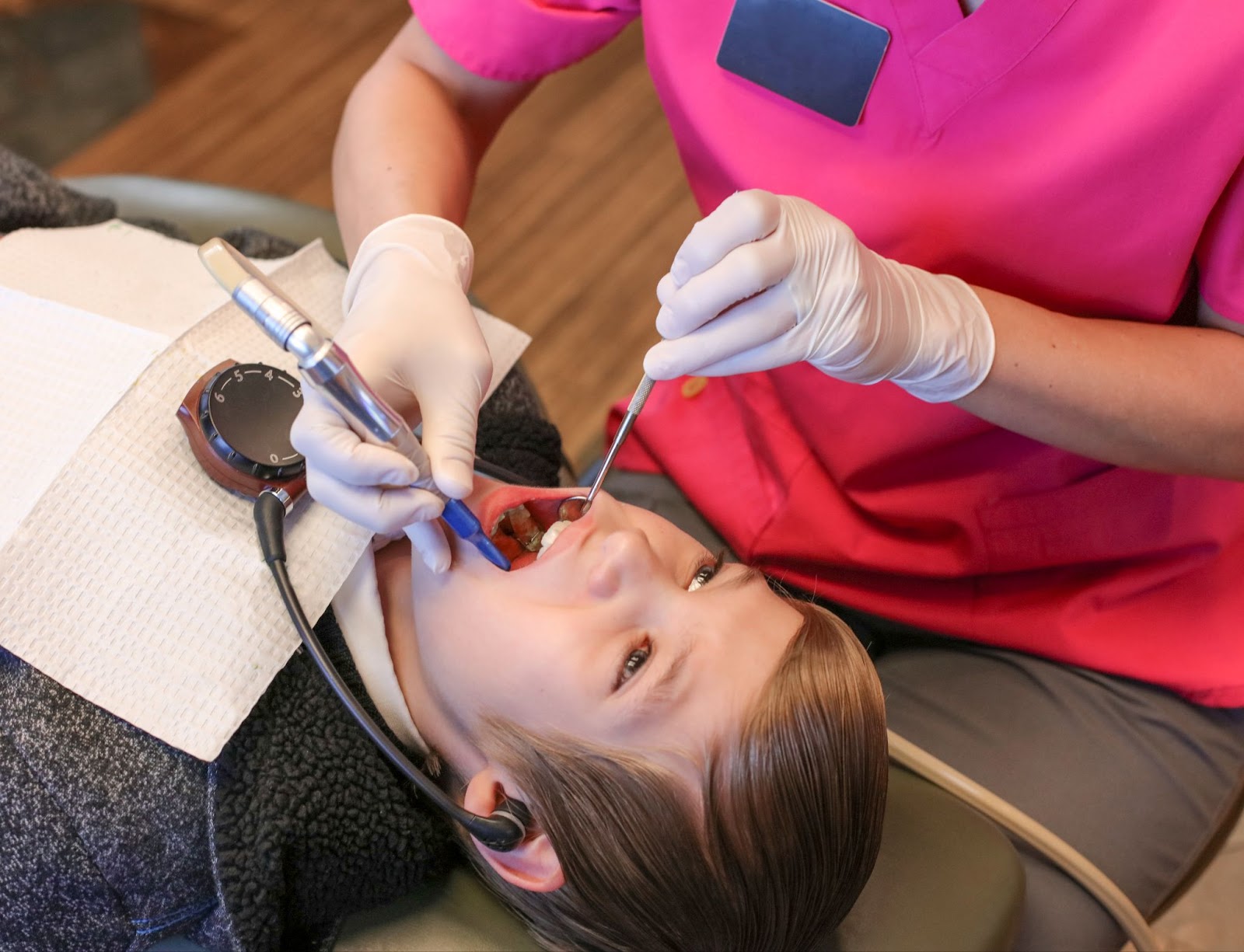At the Children’s Dental Center, we love what we do, and what we do best is setting your kid up for success with their smile! Every child deserves a lifetime of happy and healthy dental health, and a tongue tie can get in the way of that when left untreated. But what is a tongue tie, and what do we do about it? Let’s get into it!
What Is Tongue-Tie and How Does It Affect Kids?
Tongue-tie in kids may not sound serious, but it can have a lasting impact if left untreated. Officially called ankyloglossia, this condition restricts the tongue’s range of motion due to an unusually short or tight lingual frenulum—the small band of tissue connecting the tongue to the floor of the mouth. For some children, this limits how they eat, speak, and even breathe.
Defining the Condition: Ankyloglossia
Ankyloglossia varies widely in severity. Some children may have only a slight restriction, while others experience significant functional problems. The most visible sign is limited tongue movement, but this limitation can show up in surprising ways, from messy eating habits to difficulties pronouncing certain sounds.
The sooner this condition is addressed, the less likely your child will need more complex therapies later.
Why It’s Often Missed
Mild tongue-tie can fly under the radar for months or even years. Parents may not realize anything is wrong until their child enters daycare or school and struggles with communication or eating. Pediatricians may miss it in early checkups, especially if it doesn’t cause immediate feeding problems.
That’s why our team takes every complaint seriously, combining parent input with hands-on evaluation.
How It Can Evolve Over Time
In some cases, a child’s body adapts to mild tongue restrictions, but in others, problems only grow. Infants who can’t nurse well may struggle with bottle feeding, and toddlers who slur their words may face frustration in social settings. By adolescence, poor tongue mobility can even affect sleep patterns or orthodontic development.
This makes it a condition worth re-evaluating at every stage of growth.
The Role of a Pediatric Dentist
Our dentists assess all aspects of oral development, including muscular function and speech articulation. Tongue-tie often overlaps with other concerns, such as mouth breathing or dental crowding, making a pediatric dental exam a great starting point for diagnosis.
We work closely with other specialists when needed and always prioritize what’s best for your child’s growth.
Signs Your Child May Have a Tongue-Tie
Some signs of tongue-tie are easy to spot. Others are more subtle and show up over time. If your child exhibits any of the issues below, a pediatric dental evaluation may be the best next step.
Feeding Difficulties in Infancy
Feeding struggles are often the first clue. Babies with tongue-tie may have trouble latching during breastfeeding or seem unusually fussy and fatigued during feeds. Mothers may experience pain or develop mastitis as the baby compensates with a shallow or ineffective latch.
Even bottle-feeding babies may dribble milk, cough frequently, or fail to gain weight as expected.
Speech Delays or Sound Substitutions
Once your child starts talking, listen closely. If you notice trouble with “th,” “s,” “l,” or “r” sounds—or if your child seems to avoid talking altogether—it may be because they’re physically unable to move their tongue properly.
Speech therapy can help, but it’s often most effective when paired with tongue-tie treatment.
Poor Oral Hygiene or Dental Development
Kids with restricted tongue movement may have trouble clearing food from their teeth, which can lead to decay. In addition, the tongue helps shape the upper palate as children grow. If that natural force is limited, it may contribute to orthodontic issues later.
You may also see signs like constant mouth breathing or visible tension in the jaw.
Social and Emotional Effects
Kids often notice when they “talk funny” or can’t keep up with their peers. This can create self-consciousness or social anxiety. Older children may avoid reading aloud or participating in class discussions. Early treatment helps support confidence and smoother developmental milestones.

How Pediatric Dentists Diagnose and Evaluate Tongue-Tie
When you visit our offices in Collierville, Midtown, or Arlington, we take time to understand your concerns and examine your child thoroughly. Our pediatric dentists know that every child is different, and so is every case of tongue-tie.
The Importance of a Functional Exam
We begin with a detailed look at the tongue’s appearance and movement, including how far your child can lift, stick out, or sweep their tongue across their teeth. We also evaluate whether these limitations are causing real-world problems with eating, speaking, or sleeping.
In infants, we often observe a feeding session or ask detailed questions about latch quality and behavior.
Parent Feedback Matters
We want to hear what you’ve noticed at home. Are mealtimes stressful? Is your child getting frustrated when they try to speak? Have teachers mentioned unclear speech or behavioral changes? These observations help us determine whether tongue-tie is a likely cause and what kind of treatment may help.
You know your child best, and we value that insight.
When We Refer to Other Specialists
Sometimes, a collaborative approach is best. If we believe your child could benefit from additional support—such as speech therapy, lactation consulting, or ENT evaluation—we’ll help coordinate care. Our goal is full-spectrum wellness, not just a quick fix.
Frenectomy: What to Expect from Tongue-Tie Treatment
If tongue-tie is getting in the way of your child’s development, a frenectomy is a simple, effective solution. This in-office procedure is fast, low-risk, and usually well-tolerated by kids of all ages.
What Is a Frenectomy?
A frenectomy is the release of the tight frenulum under the tongue. At Children’s Dental Center, we typically perform this using laser technology. The laser minimizes bleeding and discomfort and speeds up healing.
For babies, the procedure takes just seconds. Older children may benefit from mild numbing or distraction techniques, and we will walk you through the process step by step.
How Long Does Recovery Take?
Most children bounce back within a day or two. We’ll give you specific aftercare instructions—including gentle exercises to promote full range of motion and prevent reattachment. Parents are often surprised at how quickly their child improves with feeding or speech.
You’ll also have access to our team for follow-up questions and support.
Is It Always Necessary?
Not every child with tongue-tie needs surgery. If the restriction isn’t causing functional issues, we may recommend a watch-and-wait approach. But if we see clear effects on your child’s well-being, we’ll explain why treatment is the right move—and what it can help resolve.
We take a conservative, thoughtful approach to every case.
Long-Term Benefits
Post-treatment, many families notice dramatic improvements. Babies latch better. Kids become more expressive. Parents say mealtimes and conversations feel easier. And when tongue-tie is caught early, it often prevents more complex problems down the road.
It’s a small procedure that can have a big impact.
Choosing the Right Team for Tongue-Tie Support
When it comes to treating tongue-tie in kids, experience and trust matter. At Children’s Dental Center, we’ve built a reputation for caring, knowledgeable treatment backed by years of pediatric dental expertise.
Our Team of Trusted Providers
Dr. Chris Rowland, Dr. J.B. Selecman, Dr. Cary Daniel, Dr. Melody Greene, and Dr. Brent Church bring a combined commitment to evidence-based care and child-focused communication. Each brings a unique perspective, but all share one goal: helping your child thrive. From the first visit to post-procedure check-ins, you’ll feel the difference in our approach.
We’re not just experts—we’re your partners in oral health.
Memphis Families Trust Us
With offices in Collierville, Midtown, and Arlington, we make it easy for families across the Memphis area to get specialized care close to home. Parents return to us for years—because they trust how we treat their kids. From toddlers to teens, we provide personalized support through every stage of development.
And for tongue-tie, that support can start as early as infancy.
We Follow AAPD Best Practices
We stay aligned with theAmerican Academy of Pediatric Dentistry to ensure our recommendations reflect the latest science and guidelines. Whether it’s timing treatment, selecting techniques, or coordinating referrals, we lead with knowledge and compassion.

Ready to Learn More?
If you think your child may have a tongue-tie—or just want to rule it out—contact the Children’s Dental Center today. We’ll schedule a consultation at your nearest location and help you take the next step toward comfort, clarity, and confidence for your child’s smile.
Let’s work together to support your child’s growth, right from the start.
